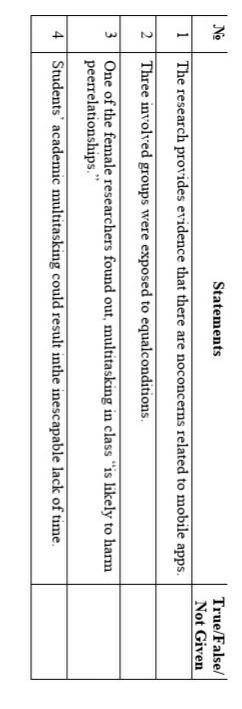дам! 10 класс
Write True, False, or Not Given for each sentence.
THE DOWNSIDE OF MOBILE DEVICES
Distraction by mobile devices is indeed something to worry about. Jeffrey Kuznekoff studies communications at Miami University Middletown in Ohio. For one recent project, he let college students take notes during a video lecture. Afterward the students took a test on the material. During the video, one group of students could text or tweet about anything. Another group could text and tweet only if the messages related to the lecture. A control group couldn’t text or tweet at all.
“Texting on things that are unrelated to class can hurt student learning,” Kuznekoff found. Overall, the control and class-related-message groups did 70 percent better on the test than did students that could text and tweet about anything. That control and relevant-message groups also scored 50 percent higher on note-taking.
“You’re putting yourself at a disadvantage when you are actively engagedwith your mobiledevice in class and not engaged in what’s going on,” warns Kuznekoff. His team shared its findings in the July 2015 issue of CommunicationEducation.
Those findings mesh with what college students themselves report. Another new study found that the more time students said that they typically text, use social media or read online during class, the lower their grades are.
“A lot of students tend to think that they are good at multitasking,” or doing more than one thing at a time, says Saraswathi Bellur. She’s a communications researcher at the University of Connecticut (UConn) in Storrs. In fact, she and her colleagues found, multitasking in class “is likely to harm their academic performance.”
“We also have data that show that people who multitask during class or while doing homework have to spend more time studying,” notes UConn coauthor Kristine Nowak. In other words, she argues, students who use mobile devices for something other than research or note- taking during class “are not efficient, and it is costing them time.” Concludes Nowak, “People believe they are better at multitasking than they are and this is leading them to bad study habits.” Her group shared its findings in the December 2015 issue of Computers in HumanBehavior.

Ответы
Показать ответы (3)
Другие вопросы по теме Английский язык
Популярные вопросы
- Есім сөзден жасалган сын есимди корсетиниз...
2 - По примыкания слова связаны в словосочетании 1долго шел 2шел по дороге...
1 - Какие из мероприятий были проведены иваном калитой...
3 - Запишите два числа , наименьшее общее кратное которых равно 34 ; 58; 65:...
3 - При пересечении прямой l с любыми прямыми ab и cd в точке о образовался...
1 - Дано sin бета =7√2/10 бета принадлежит (п/2; п) tg бета нужно найти...
1 - Спиши слова определи склонения и падежи быстрее ! из за давности у опытности...
2 - 2x+11/12=4целых11/12. уравнение с дроби....
1 - Почему книга названа тысяча и одна ночь пересказ...
3 - Как написать правильно не взысканная задолженность...
1